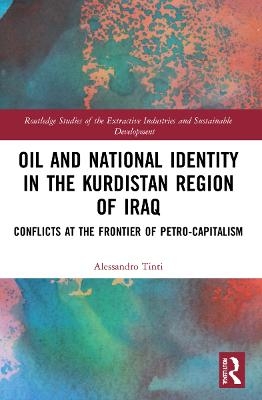
Oil and National Identity in the Kurdistan Region of Iraq
Conflicts at the Frontier of Petro-Capitalism
Seiten
2021
Routledge (Verlag)
978-0-367-75126-5 (ISBN)
Routledge (Verlag)
978-0-367-75126-5 (ISBN)
This book examines the interplay between the oil industry and identity politics using the Kurdistan Region of Iraq as a case study.
Examining the interplay between the oil economy and identity politics using the Kurdistan Region of Iraq as a case study, this book tells the untold story of how extractivism in the Kurdish autonomous region is interwoven in a mosaic of territorial disputes, simmering ethnic tensions, dynastic rule, party allegiances, crony patronage, and divergent visions about nature.
Since the ousting of Saddam Hussein, the de-facto borders of the Kurdistan Region of Iraq have repeatedly changed, with energy interests playing a major role in such processes of territorialisation. However, relatively little research exists on the topic. This book provides a timely, empirical analysis of the intersections between extractive industries, oil imaginaries, and identity formation in one of the most coveted energy frontiers worldwide. It shines a light on relations between the global production networks of petro-capitalism and extractive localities. Besides the strained federal relationship with the Iraqi central government, the transformative effects the petroleum industry has had on Kurdish society are also explored in depth. Moreover, the book fills a gap in the literature on Kurdish Studies, which has devoted scant attention to energy-related issues in the re-imagination of Kurdish self-determination.
This book will be of great interest to students and scholars of the extractive industries, energy studies, conflict studies, Middle Eastern politics, and political ecology.
Examining the interplay between the oil economy and identity politics using the Kurdistan Region of Iraq as a case study, this book tells the untold story of how extractivism in the Kurdish autonomous region is interwoven in a mosaic of territorial disputes, simmering ethnic tensions, dynastic rule, party allegiances, crony patronage, and divergent visions about nature.
Since the ousting of Saddam Hussein, the de-facto borders of the Kurdistan Region of Iraq have repeatedly changed, with energy interests playing a major role in such processes of territorialisation. However, relatively little research exists on the topic. This book provides a timely, empirical analysis of the intersections between extractive industries, oil imaginaries, and identity formation in one of the most coveted energy frontiers worldwide. It shines a light on relations between the global production networks of petro-capitalism and extractive localities. Besides the strained federal relationship with the Iraqi central government, the transformative effects the petroleum industry has had on Kurdish society are also explored in depth. Moreover, the book fills a gap in the literature on Kurdish Studies, which has devoted scant attention to energy-related issues in the re-imagination of Kurdish self-determination.
This book will be of great interest to students and scholars of the extractive industries, energy studies, conflict studies, Middle Eastern politics, and political ecology.
Alessandro Tinti holds a PhD in Political Science and International Relations from the Sant’Anna School of Advanced Studies, Italy. He is currently Research Fellow at La Sapienza University of Rome and Adjunct Professor at the University of Bologna, Italy.
Introduction: the trail of oil 1. The nature of conflict: on oil and violence 2. The Kurdistan Region of Iraq: borders, identity, oil 3. The gate to statehood: Kurdish nationalism and the oil dream 4. A nation divided: Kurdish infighting and black gold 5. No friends but the mountains: extractivism and social control Conclusions: the making of oil environments
| Erscheinungsdatum | 01.12.2021 |
|---|---|
| Reihe/Serie | Routledge Studies of the Extractive Industries and Sustainable Development |
| Zusatzinfo | 1 Halftones, black and white; 1 Illustrations, black and white |
| Verlagsort | London |
| Sprache | englisch |
| Maße | 156 x 234 mm |
| Gewicht | 412 g |
| Themenwelt | Sozialwissenschaften ► Politik / Verwaltung |
| Sozialwissenschaften ► Soziologie ► Spezielle Soziologien | |
| Technik ► Bergbau | |
| Technik ► Umwelttechnik / Biotechnologie | |
| Wirtschaft ► Volkswirtschaftslehre | |
| ISBN-10 | 0-367-75126-7 / 0367751267 |
| ISBN-13 | 978-0-367-75126-5 / 9780367751265 |
| Zustand | Neuware |
| Haben Sie eine Frage zum Produkt? |
Mehr entdecken
aus dem Bereich
aus dem Bereich
eine Einführung
Buch | Softcover (2024)
De Gruyter Oldenbourg (Verlag)
CHF 41,90


